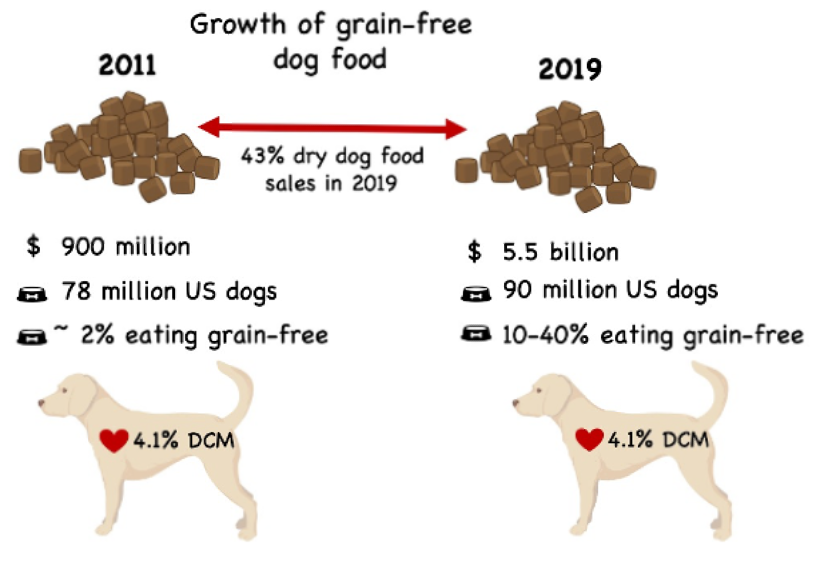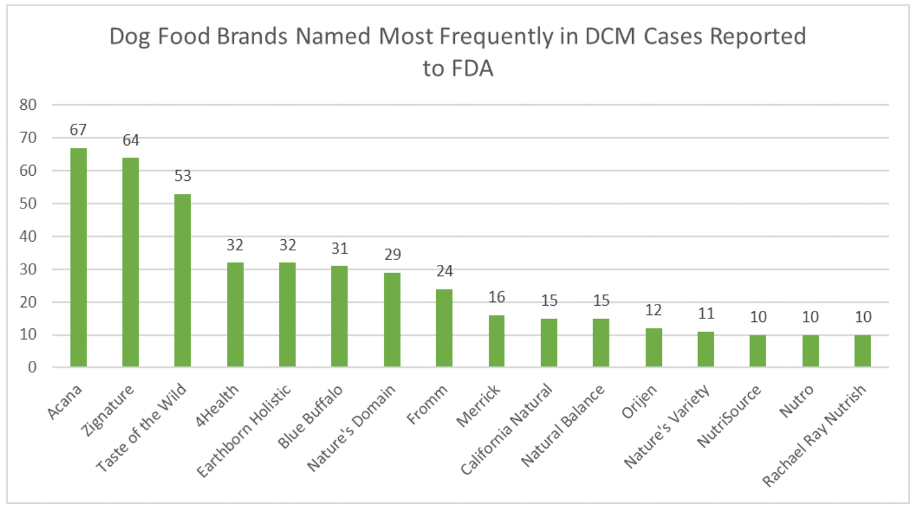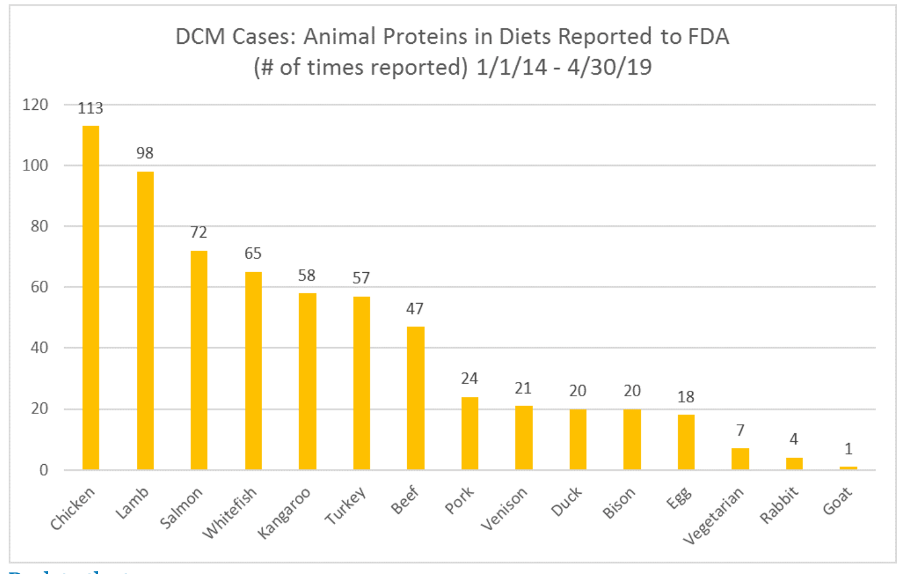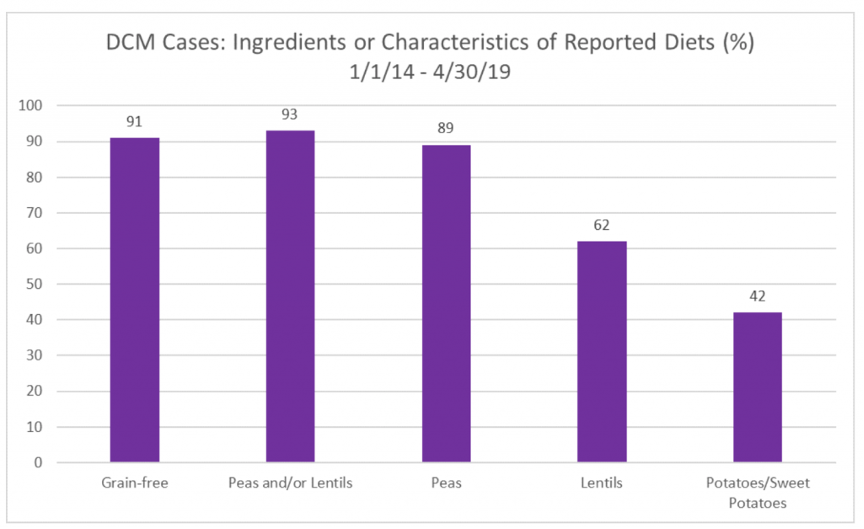I have been following the controversy, and the research, on diet-associated dilated cardiomyopathy (DCM) in dogs since the issue was first addressed by the FDA in 2018. I recently had a chance to talk with Andy Roark on his Cone of Shame podcast about the subject, and I will share that when it is available. In the meantime, I wanted to post an update on the subject and also collect all of my reporting and the main sources of evidence in one place.
This is a complex subject, and a great example of the scientific process. An observation (an apparent increase in the number of dogs not usually vulnerable to DCM developing the disease while eating grain-free or other non-traditional diets) led to a hypothesis (some component of these diets was causing DCM in these dogs). Clinicians and researchers and members of the pet food industry have all weighed in on the subject with a variety of perspectives and interpretations of the facts. The evidence is still limited, and no definitive, science-based conclusion has emerged.
While the evidence is developed, we are able to watch not only the scientific process in action but also the influence of ego, personal bias, financial bias, and other human factors that so often influence how we approach understanding new ideas and problems in medicine. This can shed light on both the strengths and weaknesses of veterinary research and medicine.
Just to start with clarity, I will give you the bottom line as I see it:
Bottom Line
- Some dogs of breeds not known to be genetically prone to DCM have developed this disease.
- Many of these dogs have been eating diets that are grain-free or that contain pulses and legumes (e.g. peas, lentils, etc.).
- Many of these dogs have experienced partial or complete recovery with diet change, supplementation of taurine or other nutrients, and a variety of common treatments for heart disease. This is encouraging since genetic DCM is usually not very responsive to treatment and is typically fatal.
- There is uncertainty and disagreement about key facts, including
- Whether or not the incidence of DCM is increasing
- Whether or not more dogs of breeds not usually prone to DCM are getting the disease
- If diet is truly the main cause of DCM in these dogs
- What features of diets associated with DCM may be responsible for the disease
- What the role of taurine is in diet-associated DCM
- How diet and genetics and other unidentified factors may interact to produce DCM
- No one on either “side” of the debate believes we have sufficient evidence to definitively answer these questions, and more research is ongoing
- The process of understanding this complex issue will take years and will likely lead to an understanding more nuanced and complicated than the simplest versions of current theories
- Economic interests significantly complicate the scientific process of understanding any relationship between diet and DCM. Because the concerns and potential changes in diet they might suggest entail an economic cost to some individuals and companies, this increases concerns about confirmation bias and funding bias in all of the debates and research around this subject.
What Should Dog Owners Do?
While there is still significant uncertainty, it is reasonable to be concerned that diets which are grain-free or contain legumes in the top 5-10 ingredients may put some dogs at greater risk of developing DCM. There are no proven health benefits to these diets, so even with uncertainty about the level of risks, it is not unreasonable to consider avoiding these diets, especially if you have a dog of a breed reported as experiencing diet-associated DCM (e.g. golden retrievers, Irish wolfhounds, American Cocker spaniels, Newfoundlands, St. Bernards). This may turn out to be an unnecessary precaution, but the limited evidence suggests potential risks may be greater than hypothesized benefits.
If you are feeding a diet with no grains or with legumes or a diet that has been listed by the FDA as potentially associated with DCM, it is reasonable to have your dog screened for DCM and taurine deficiency by your veterinarian.
If you have a dog with DCM, regardless of breed, it is reasonable to consider changing to a diet containing grains and supplementing taurine along with any other treatments recommended by your veterinarian. There is some evidence that these actions may improve the chances or survival and even recovery in some dogs.
My Posts and Articles on Diet-associated DCM
Grain-free Diets and Heart Disease in Dogs
August, 2018
FDA Webinar Discussing Dietary Risk Factors for Dilated Cardiomyopathy
September, 2018
Evidence Update: Grain-free and other “BEG” Diets Associated with Heart Disease in Dogs
December, 2018
FDA Update on Grain-free Diets and Heart Disease in Dogs
June, 2019
Column in VPN about Diet-associated DCM and the McCauley et al. Review
September, 2020
The Latest on Dietary Risk Factors for Dilated Cardiomyopathy (DCM) & Misleading Media Spin by Grain-free Diet Manufacturers
November, 2020
Other Relevant Publications
Early 2000s to 2017
Grain-free diets began to grow in popularity due to claims they might reduce food allergies (which are still unproven) and in response to “gluten-phobia” and other cultural factors. These diets went from uncommon to a large share of the dog food market.


FDA Announcement 2018
The FDA had received a steady trickle of reports of DCM in dogs for some time (~1-2/year, total of 13 from 2014-2017). Then the saw a spike in reports in the first half of 2018 (16 cases). Most of these dogs (>/= 90%) were eating grain-free diets. This led to a public announcement in July, 2018 letting veterinarians and pet owners know about the case reports and encouraging awareness and reporting of the disease. This led, naturally, to an increase in reports. Some have argued that this introduced a sampling bias and that the reason there are more reported cases is not because there truly are more cases but because there is more awareness and concern about the issue. There is likely some truth to this, however it is important to remember that the spike in reports predated the FDAs first public announcement, and that the only way we ever find out about relatively uncommon diseases is through encouraging surveillance and reporting.
The FDA made additional announcements in February, 2019 and June, 2019. These were both followed by an increase in reports, but reports did continue between announcements. The FDA also has indicated that reports of DCM in dogs are down significantly in 2020, but that reports of all conditions have decreased due to the COVID pandemic.

Kaplan et al., December 2018
Kaplan JL, Stern JA, Fascetti AJ, Larsen JA, Skolnik H, et al. (2018) Taurine deficiency and dilated cardiomyopathy in golden retrievers fed commercial diets. PLOS ONE 13(12): e0209112.
This study evaluated 24 Golden retrievers with DCM to investigate possible dietary causes and the role of taurine. 11 of these dogs were in congestive heart failure. Many of these dogs were eating grain-free diets or diets containing legumes, and 15/24 were eating ACANA, one of the brands later identified by the FDA as common to many of the cases. These dogs appeared to have low taurine levels compared with healthy golden retrievers, but “normal” taurine levels, in general and for specific breeds, have not been clearly established. There was a correlation between the ACANA diet and taurine level, but no correlation with the other diets. 22/23 dogs were eating lower calorie levels than predicted for their body size, which has fed some theories that one element of the problem may be relative deficiency in protein or taurine precursors in individual dogs who tend to eat less than typical dogs their size.
All dogs were treated with standard therapies for heart disease as well as taurine supplementation. Some also received other supplements (e.g. l-carnitine), and 21/24 changed diets. Of these 7 changed to diets containing grains, 4 to different grain-free diets. Almost all the dogs improved, and of those in congestive heart failure, 5/11 were able to discontinue their diuretic therapy completely, and 4 were able to reduce the dose of this medicine. Only one dog failed to improve.
This study supports the hypothesis that in golden retrievers diet-associated taurine deficiency can lead to DCM which can be improved or even cured with diet change and medical therapy. However, the small number of dogs and the great variation in their management and nutrition is a weakness of the study, and it is not conclusive. Nor does this study say much about DCM in other breeds or in dogs who are not taurine deficient.
Adin et al 2018
Darcy Adin, Teresa C. De Francesco, Bruce Keene, Sandra Tou, Kathryn Meurs, Clarke Atkins, Brent Aona, Kari Kurtz, Lara Barron, Korinn Saker. Echocardiographic phenotype of canine dilated cardiomyopathy differs based on diet type.J Vet Cardiol. 2019;21:1-9.
Though published in 2019, this study was reported at the ACVIM Forum in 2018 and was referred to in some of the early papers discussing diet-associated DCM. It was a retrospective study of dogs with DCM and a known diet history seen between 2015 and 2018. The main finding was that dogs on grain-free diets tended to have more severe changes in their hearts on ultrasound than dogs on diets containing grains. Most of these dogs did not have taurine deficiency. 7/48 dogs improved with diet change (6 of these also got taurine supplementation).
This study doesn’t address a number of the key issues in the controversy, but it does show that taurine deficiency is not the only mechanism by which diet might be causing DCM and that breeds other than golden retrievers are affected.
Freeman et al Dec., 2018
Freeman LM, Stern JA, Fries R, Adin DB, Rush JE. Diet-associated dilated cardiomyopathy in dogs: what do we know? J Am Vet Med Assoc. 2018 Dec 1;253(11):1390-1394. doi: 10.2460/javma.253.11.1390.
This was a commentary summarizing the research findings and hypotheses to that point. The authors reported a subjective impression among cardiologists they surveyed that DCM was being seen more often and more commonly in breeds not previously known to be susceptible to it. Many of these dogs were on nontraditional diets, including diets that were grain free, that contained legumes/pulses, that had unusual protein sources, or that were made be relatively new and small companies. These were called BEG diets as a shorthand (boutique manufacturers, exotic protein, grain free). This acronym has generated a great deal of rancor in the pet food industry.
The authors were explicit about the fact that there was insufficient data to show these observations were even correct, much less that there was a causal relationship between specific aspects of BEG diets and DCM. The paper was intended to start, not finish, a conversation and research effort to understand the initial observations and hypotheses.
FDA Feb 2019 Announcement
At this point, the FDA detailed the case reports they had received. The agency indicated that 294 cases had been reported, 90% of which were being fed grain-free diets, mostly containing lentils, and that the other diets involved were often vegetarian diets.
FDA June 2019 Announcement
In this announcement, the FDA detailed the breeds and specific brands of food included in the reports the agency had received to that date. This generated a great deal of controversy from industry, especially as the market share of some brands and grain-free diets declined noticeably after the announcement. Despite the uncertainties about the causal role of diet in DCM, the fact that certain brands predominate in these reports is a legitimate piece of data and cause for concern. While the FDA has tried to be very politic about not blaming specific manufacturers or products or ingredients for diet-associated DCM, it is obliged to make this information available so that appropriate investigations can be carried out.
Similarly, the overrepresentation of relatively rare protein sources, such as kangaroo, in the diets associated with these cases raises a legitimate question about the potential role of such proteins in this disease. The amino acid profile and bioavailability of uncommon protein sources is not as well-characterized as those of common proteins such as beef, chicken, and pork, and until this research is done, it is reasonable to ask whether such sources might have relevant deficiencies. More recent reporting by the FDA, though, has not found consistent associations between protein source and DCM, even as the association between legumes and grain-free diets has remained strong.



McCauley et al 2020
McCauley SR, Clark SD, Quest BW, Streeter RM, Oxford EM. Review of canine dilated cardiomyopathy in the wake of diet-associated concerns. J Anim Sci. 2020;98(6).
This is a comprehensive narrative review of DCM and various known and potential causes. I have written about this paper in detail elsewhere. It is a useful contribution to the discussion, and it makes several important points about the limitations of existing research evidence:
- the studies include few subjects
- there is variable representation of breeds with different genetic predispositions to DCM
- diet and health histories are often incomplete
These limitations preclude any definitive conclusion regarding a causal relationship between BEG diets and DCM. In emphasizing that additional research is needed to clarify the role of diet in DCM, the review authors agree with the authors of the papers proposing the hypothesis.
However, the authors of this review also chose not to address other information relevant to evaluating the hypothesis, including:
- patients with DCM from breeds not previously thought to be predisposed to the disease are disproportionately represented among cases fed BEG diets
- a large proportion of diets associated with DCM cases were produced by small manufacturers or contained uncommon protein sources even though such diets are a small fraction of those on the market
The authors make several strong statements that go beyond a factual critique of the existing evidence:
The use of the acronym BEG and its association w/ DCM are without merit because there is no definitive evidence in the literature.
This exhaustive review of the literature provides support that eliminates the pet food characteristics that have been implicated to have a subjective association with DCM.
Unfortunately, the arguments made in this paper are undercut by the failure of the authors to disclose up front that several of them are employed by companies producing grain-free diets or by BSM, a nutrition consulting firm that does business with such companies. Since the publication of this review, BSM has accepted a grant from a pulse manufacturer and active opponent of the BEG diet hypothesis to study the issue.
These conflicts of interest do not necessarily invalidate the authors’ points, but they do remind us that financial bias is a relevant concern in debates about scientific issues, especially when the evidence is preliminary and uncertain.
Ontiveros et al May, 2020
Ontiveros ES, Whelchel BD, Yu J, et al. Development of plasma and whole blood taurine reference ranges and identification of dietary features associated with taurine deficiency and dilated cardiomyopathy in golden retrievers: A prospective, observational study. Staffieri F, ed. PLoS One. 2020;15(5):e0233206. doi:10.1371/journal.pone.0233206
This study evaluated taurine levels in 86 golden retrievers eating traditional dry dog foods (contains grains, no legumes other than soy and no potatoes in the top 5 ingredients, manufactured by a large company) or nontraditional diets (kibble or raw diet with no grains, legumes or potatoes, or made by a small company).
Taurine levels were found to be lower in dogs on the nontraditional diets. These dogs were also more likely to have ultrasound findings suggestive of DCM. A number of methodological concerns and potential conflicts of interest have been raised about the study, some acknowledged and others disputed by the authors.
KSU Virtual Conference, Sept. 2020
The FDA organized a virtual conference on the subject of diet-associated DCM through Kansas State University. Many of the presentations are available there, though not all.
The FDA provided updated statistics on the case reports received (1100 canine cases as of July, 2020 from all 50 states and Canada) and preliminary data on a sibset of cases analyzed by theVeterinary Laboratory & Investigation Response Network (Vet-LIRN).
Of 150 cases reported between 1/2018 to 4/2019, 107/121 recovered fully or partially. All of the dogs who recovered fully had changed diets, and many had received taurine, pimobendan, and other treatments. Full recovery took 7-13 months.
Consistent with previous reports, 90% or more of the diets fed before the DCM diagnosis were grain free and had legumes high in the ingredient list. The protein sources in the diets fed to these cases were varied, and no consistent association was seen.
Representatives from BSM also made several presentations at the symposium supporting several claims:
- There is no actual increase in DCM associated with increasing popularity of grain-free diets
- There is no change in the breeds being diagnosed with DCM, and most are still breeds with known genetic predispositions
- Only fasted plasma taurine levels have been shown to correlate with taurine level sin heart muscle, so the methods used to measure taurine in other studies may not be reliable
- There is no evidence that small pet food manufacturers have lesser quality control than larger companies or are disproportionately represented among cases of DCM reported to the FDA
Data from a survey of cardiology practices that was presented by BSM at the conference was subsequently published as a preprint for a journal article still undergoing peer review:
Quest B, Clark SD, Garimella S, Konie A, Leach SB, Oxford EM. Incidence of canine dilated cardiomyopathy, breed and age distributions, and grain-free diet sales in the United States from 2000-2019: A retrospective survey. bioRxiv. September 2020:2020.09.27.315770. doi:10.1101/2020.09.27.315770
Pezzali et al, January, 2020
Pezzali JG, Acuff HL, Henry W, Alexander C, Swanson KS, Aldrich CG. Effects of different carbohydrate sources on taurine status in healthy Beagle dogs. J Anim Sci. 2020;98(2). doi:10.1093/jas/skaa010
In this lab study, 12 Beagles were fed diets with grains or diets without grains and utilizing potatoes, peas, or tapioca starch as a carbohydrate source. Taurine levels did not differ between the groups. The relevance of this for other breeds, other diets, and DCM in dogs without taurine deficiency are unclear.
Donadelli et al, July, 2020
Donadelli RA, Pezzali JG, Oba PM, et al. A commercial grain-free diet does not decrease plasma amino acids and taurine status but increases bile acid excretion when fed to Labrador Retrievers. Transl Anim Sci. 2020;4(3). doi:10.1093/tas/txaa141
In this lab study, 8 Labrador retrievers were fed an ACANA grain-free diet for 26 weeks and their taurine levels were measured. No decline in taurine was seen. The relevance of this for other breeds, other diets, and DCM in dogs without taurine deficiency are unclear.
Freid Nov 2020
Freid KJ, Freeman LM, Rush JE, et al. Retrospective study of dilated cardiomyopathy in dogs. J Vet Intern Med. December 2020.
This study looked at medical records of dogs diagnosed with DCM at the Tufts Veterinary School between 2014 and 2018. Data from 71 dogs were analyzed, and 56/72 were eating nontraditional diets (grain-free, containing pulses, or manufactured by a company not meeting international industry standards). Dogs in the two diet categories were similar in most ways, though dogs on nontraditional diets were more likely to be in congestive heart failure when diagnosed. Taurine was only measured in a few dogs, most in the nontraditional diet group, and was only low in a couple of them. The study also reported an increase in the number of DCM cases seen at the hospital, and this began in 2016, before the first FDA announcement about diet-associated DCM in 2018.
Dogs were treated with a variety of different medications for their heart disease. Some received taurine supplementation (almost all in the nontraditional diet group), and about 55% in the nontraditional diet group had their diet changed while only 49% of those in the other group changed foods. Dogs eating a nontraditional diet that had a diet change lived significantly longer than dogs who did not. The authors concluded:
The underlying cause of diet-associated DCM remains unknown but is being actively investigated by the FDA and several researchers. Diet-associated deficiencies, toxins, or a multifactorial etiology (eg, nutritional, other environmental factors, genetics) remains possible explanations. The underlying cause of diet-associated DCM remains unknown but is being actively investigated by the FDA and several researchers. Diet-associated deficiencies, toxins, or a multifactorial etiology (eg, nutritional, other environmental factors, genetics) remains possible explanations. The underlying cause of diet-associated DCM remains unknown but is being actively investigated by the FDA and several researchers.










Am I reading your one graphic correctly? The grain free diets have increased in market share, more dogs are eating grain free, but the percentage of dogs with DCM has stayed at about 4.1%?
This is the claim made in a presentation at the KSU symposium by BSM, the nutrition consulting firm involved in the McCauley literature review, and in this paper, which is a preprint of a not-yet-reviewed retrospective survey of cardiology practices in the U.S. and Canada. Others (e.g. the Freeman et al paper and the Freid et al retrospective study) have claimed that there is an increase in the incidence of DCM that parallels the increasing use of grain-free diets. These competing claims are based on estimates of incidence which differ and which are all based on surveys and retrospective studies, none of which are very accurate, so thee core questions of whether DCM is more common than it used to be and occurring more frequently in breeds not previously seen with it hasn’t been definitively answered.
Pingback: Grain-free Diets and heart Disease in Dogs: Two New Studies |
Hi Skeptvet, just wondering if you are aware of any updated information on the subject of diet and DCM since this post?
Several studies are in process, but no new results. The FDA is apparently going to release some additional case reports by the end of the year, but no idea what will be in that.
Thanks!
https://www.vin.com/members/cms/document/default.aspx?id=11279796&template=articleview&f5=1 not sure this will go through. the grain free products not id